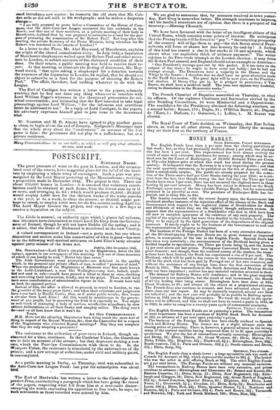The Globe is assured, on authority upon which it places
full reliance, that Ministers have determined to recall Lord De Grey from the Govern- ment of Ireland, though he will not leave Dublin till the spring; and it is added, that the Duke of Richmond is mentioned as the new Viceroy.
A valued correspondent in Ireland—not a party man, but one whose dispositiou and station make him conservative of what is good—has sent to-us the following well-merited strictures on Lord Eliot's tardy circular against party-misuse of the Arms Act. Dublin, 28th December 1843.
MR. SPECTATOR—Lord Eliot's circular to the Magistrates, dated the 233 instant, appears in our newspapers of this morning. It is one of those measures of which it can hardly be said, Better late than never." The Irish Government want promptitude—are deficient in the quality which, in the personal and private affairs of men, is called " presence of mind." When the proceedings of the Magistrates at Macroom were first made known to the Lord-Lieutenant, a man like Wellington—any man, indeed, quali- fled and need to rule—would have penned a letter to them at once, checking -sad correcting their indiscretion, briefly, and to the point. There would have been some manifestation of administrative vigour in this. It would have told ea both the opposed parties. Instead of this, the affair is allowed to proceed, to travel to London, to run the gauntlet of the saucy press there; and when their criticisms and judgments have come back to Dublin Castle, then, as if under public rebuke, then issues a circular from Lord Eliot 1 All this would be mischievous in the govern- ment of any people, but in governing the Irish it is especially so. You might as well think of managing a body of restless, unreflective schoolboys, by slow e ibinet deliberations on all their freaks and naughty sallies. The thing won't As—and we all here know that it won't do.
Yours, AN OLD CORRESPONDENT.
N.B. Have not the offending Magistrates been doing much the same sort of , thing in respect of the Repeal Wardens, &c., that the Chancellor did in respect . of the Magistrates who attended Repeal meetings? May they not complain Sisal they are only adopting a precedent ?
The resistance to the collection of poor-rates in Ireland, though un- seiwerved for a time, continues. In the Castlebar Union, the Guardians tare in debt on account of the arrears ; but they deprecate making a new wale, which the Poor-law Commissioners wish them to do. In the 'Westport Union, the resistance is stimulated by the exhortations of the -priests; and a new attempt at collection, under civil and military guard, is- contemplated.






















 Previous page
Previous page